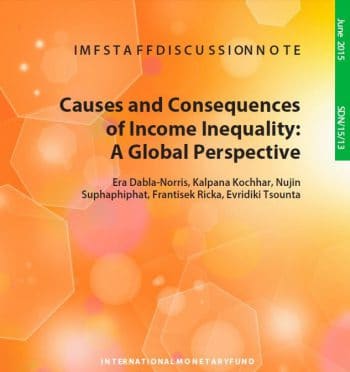
Policy highlights:
- This International Monetary Fund Staff Discussion Note reviews how inequality affects growth and how it develops differently in different contexts. It finds that when the income share of the rich increases, GDP growth tends to decline (indicating that there is no ‘trickle down’ effect). At the same time, when the income share of the bottom 20% grows, there is higher GDP growth. To support growth, it is recommended to support both the poor and the middle class.
- Key findings relevant to emerging markets and developing countries (EMDCs) include: 1) technological advances and increased differences in wages for people with different skill levels have contributed to inequality, 2) high inequality hampers growth by depriving low-income households of the ability to stay healthy and accumulate physical and human capital, 2) inequality can lead to policies that hurt growth (i.e. by fuelling protectionism), 3) inequality in education has declined over the past 60 years, however, almost 60% of the poorest youth (aged 20–24 years) in Sub-Saharan Africa have fewer than 4 years of schooling, compared to 15% in the richest quintile, and 4) an increase in financial services is associated with rising inequality. In many EMDCs, low-income households and small-scale firms face challenges in accessing financial services due to lack of financial knowledge and market failures. The available financial products tend to be more limited and relatively costly for such groups.
- An increase in redistributive fiscal policies should lead to a decrease in fiscal inequality, if underlying drivers and country-specific policy and institutional settings are considered. Recommendations for policymakers include: 1) supporting financial inclusion, 2) raising average living standards, which can also influence the distribution of income, 3) supporting education, and 4) creating quality jobs by focusing on addressing market imperfections (i.e. installing a minimum wage and creating incentives to move out of informality).









